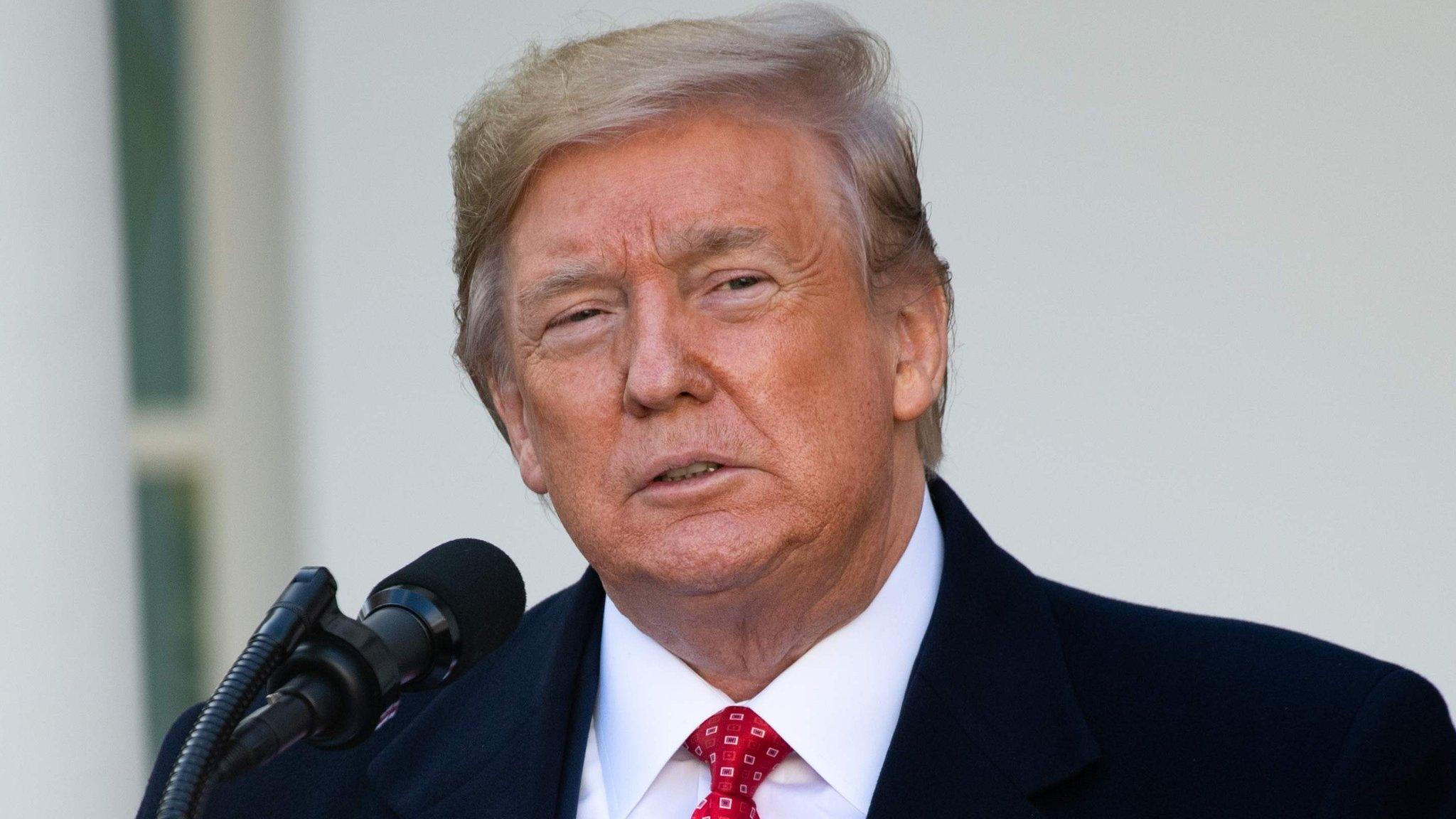Trump impeachment: Three law experts tell committee he should be removed
- Published
How four legal experts see the impeachment inquiry
There is no doubt that President Donald Trump's actions require him to be removed from office, three scholars of US constitutional law have testified.
The three experts described Mr Trump's efforts to solicit help from a foreign nation as a crime and accused him of obstructing justice.
Four experts, three picked by Democrats and one by the Republicans, have been testifying in Congress.
The fourth said Mr Trump's actions were wrong, but not impeachable.
As the investigation entered a new phase, the experts testified to the House Judiciary Committee which began hearings aimed at drawing up articles of impeachment.
Its hearings come hot on the heels of the House Intelligence Committee's investigation, which concluded on Tuesday with a 300-page report accusing Mr Trump of putting his own personal political interests "above the national interests of the United States" by soliciting foreign interference in the 2020 US elections.
The impeachment process began in September after an anonymous whistleblower complained to Congress about a July phone call by Mr Trump to the president of Ukraine, in which Mr Trump appeared to tie US military assistance to Ukraine launching investigations which would help him politically.
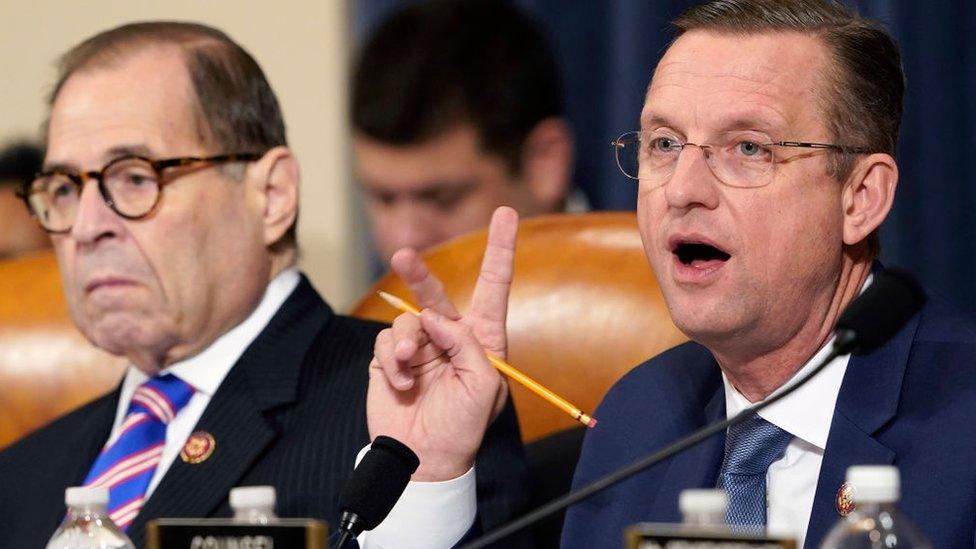
Democratic Judiciary Chairman Jerry Nadler (left) and Republican Ranking Chairman Doug Collins
The White House has rejected the allegations made by Democrats, who hold the majority in the House of Representatives. Mr Trump questioned the patriotism of Democrats, asking: "Do they love our country?"
Among formal impeachment charges expected to be considered by the judiciary committee are abuse of power, obstruction of justice and contempt of Congress.
Democrats are keen to hold a vote on impeachment in the House of Representatives before the end of the year, with the prospect of a trial in the Senate perhaps as early as January 2020.
What did the experts say?
The four law professors questioned by the committee were:
Stanford University's Prof Pamela Karlan, Harvard University's Prof Noah Feldman and from the University of North Carolina, Prof Michael Gerhardt, chosen by the Democrats.
George Washington University's Jonathan Turley, picked by Republicans.
The legal experts interpreted the impeachment clause of the constitution, which allows for presidents to be removed from office due to "high crimes and misdemeanours".
Prof Feldman testified that the "evidence clearly constitutes" an impeachable offence because Mr Trump's interactions with Ukraine show him "corruptly using the powers of the presidency for personal political gain".
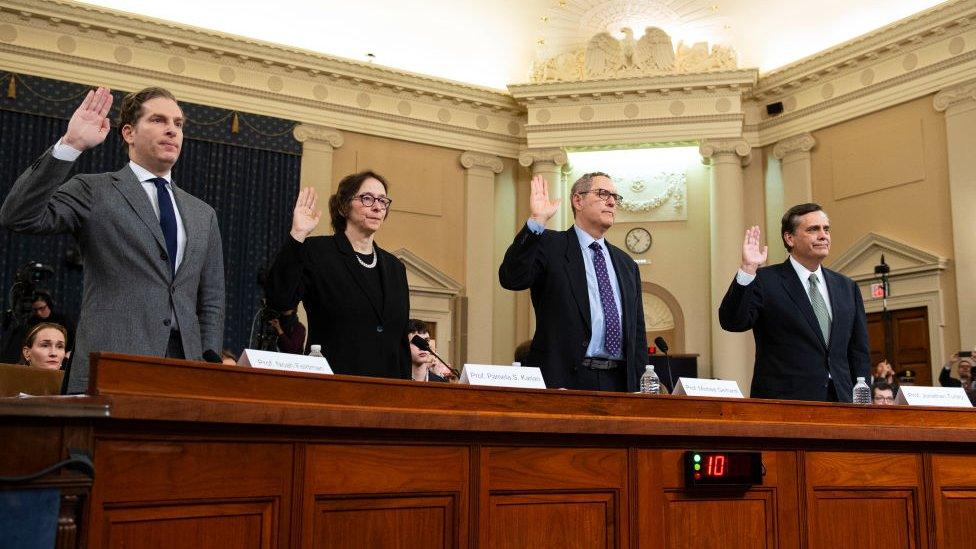
From left: Profs Noah Feldman, Pamela Karlan, Michael Gerhardt and Jonathan Turley
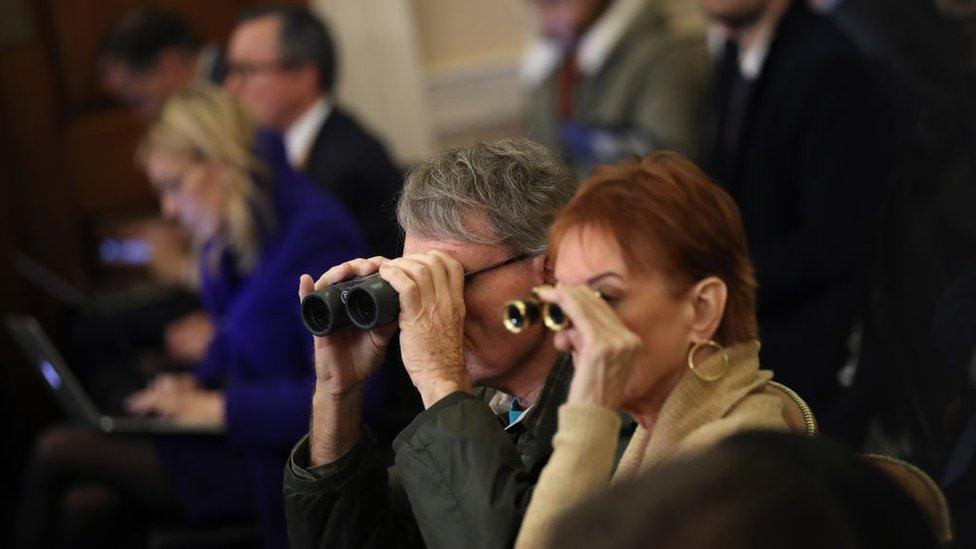
Some spectators even brought binoculars to the hearing
As she began her testimony, Prof Karlan scolded the committee's top Republican, saying she was "insulted" by his comment implying that she had not reviewed the intelligence committee's public testimony of 12 witnesses.
Professor Pamela Karlan rebukes Republican congressman
"I would like to say to you, sir, that I read transcripts of every one" of the witnesses, she said. "But everything I read on those occasions tells me that when President Trump invited, indeed demanded, foreign involvement in our upcoming election, he struck at the very heart what makes this a republic to which we pledge allegiance."
Mr Trump has attacked the "safeguards against establishing a monarchy in this country", Prof Gerhardt stated.
"The president's serious misconduct, including bribery, soliciting a personal favour from a foreign leader in exchange for his exercise of power, and obstructing justice and Congress are worse than the misconduct of any prior president, including what previous presidents who faced impeachment have done or been accused of doing," he said in his opening remarks.
"If what we're talking about here is not impeachable, nothing is impeachable," he added.
Prof Turley, who was chosen as a witness by Republicans, said he disagreed with Mr Trump's conduct but "this is not how an American president should be impeached". He also warned that Democrats are setting a dangerous precedent.
"I get it. You are mad. The President is mad. My Democratic friends are mad. My Republican friends are mad...." he said. "We are all mad and where has it taken us? Will a slipshod impeachment make us less mad or will it only give an invitation for the madness to follow in every future administration?"

A treat for law students

For Americans nostalgic about their days in law school, or perhaps wondering what it is like to sit through a professorial lecture, Wednesday morning's impeachment hearings were a treat.
For the rest? Well, network TV was airing the Wendy Williams Show, with guests Morris Day and celebrity chef Jacques Torres.
Those who did tune in heard noted legal scholars opine about the history and nature of presidential impeachment from the time of the Founding Fathers to the present.
Democrats - because they have a majority on the committee - selected three of the participants. Not surprisingly, they all agreed that Donald Trump's conduct constituted impeachable offences.
Jonathan Turley, picked by the Republicans, acknowledged that the president's actions were far from "perfect," but lamented the anger in American politics and warned that action in this case would dangerously lower the bar for impeachable conduct for future presidents. It wasn't exactly the full-throated defence the president enjoys from his political allies.
The stated task for the judiciary committee in the coming days will be to determine whether the facts established in the earlier intelligence committee hearings constitute impeachable acts. That's what the professors were there to help accomplish. In reality, it seems the minds of most on the committee - as with the witnesses - are already made up.
The real drama on Wednesday occurred behind closed doors, as House Speaker Nancy Pelosi held a private meeting with her fellow House Democrats to determine a path forward. With all signs pointing toward presidential impeachment as a probable outcome, the big question could be what articles of impeachment look like and the timing for their presentation.
With public opinion on the matter fairly set along partisan lines, that more than anything, could decide how this process plays out in the days ahead.

Want to find out more?

A SIMPLE GUIDE: If you want a basic take, this one is for you
GO DEEPER: Here is a 100, 300 and 800-word summary of the story
WHAT IS IMPEACHMENT? A political process to remove a president
VIEW FROM TRUMP COUNTRY: Reaction from a West Virginia town
CONTEXT: Why Ukraine matters to the US
FACT-CHECK: Is the whistleblower linked to the Democrats?

What is Trump accused of?
Democrats say Mr Trump dangled two bargaining chips to Ukraine - $400m (£309m) of military aid that had already been allocated by Congress, and a White House meeting for President Volodymyr Zelensky - to obtain the investigations. They think this political pressure on a vulnerable US ally amounts to an abuse of power.
The first investigation Mr Trump wanted from Ukraine was into former Vice-President Joe Biden, his main Democratic challenger, and his son Hunter. Hunter joined the board of a Ukrainian energy company when Joe Biden was US vice-president.
The second Trump demand was that Ukraine try to corroborate a conspiracy theory that Ukraine, not Russia, interfered in the last US presidential election. This theory has been widely debunked, and US intelligence agencies are unanimous in saying Moscow was behind the hacking of Democratic Party emails in 2016.
Ukrainian foreign minister Prystaiko dismissed allegations the country interfered in US election

How does impeachment work?
Impeachment is the first part - the charges - of a two-stage political process by which Congress can remove a president from office.
If, following the hearings, the House of Representatives votes to pass articles of impeachment, the Senate is forced to hold a trial.
A Senate vote requires a two-thirds majority to convict and remove the president - unlikely in this case, given that Mr Trump's party controls the chamber.
Only two US presidents in history - Bill Clinton and Andrew Johnson - have been impeached, but neither was convicted.
President Richard Nixon resigned before he could be impeached.
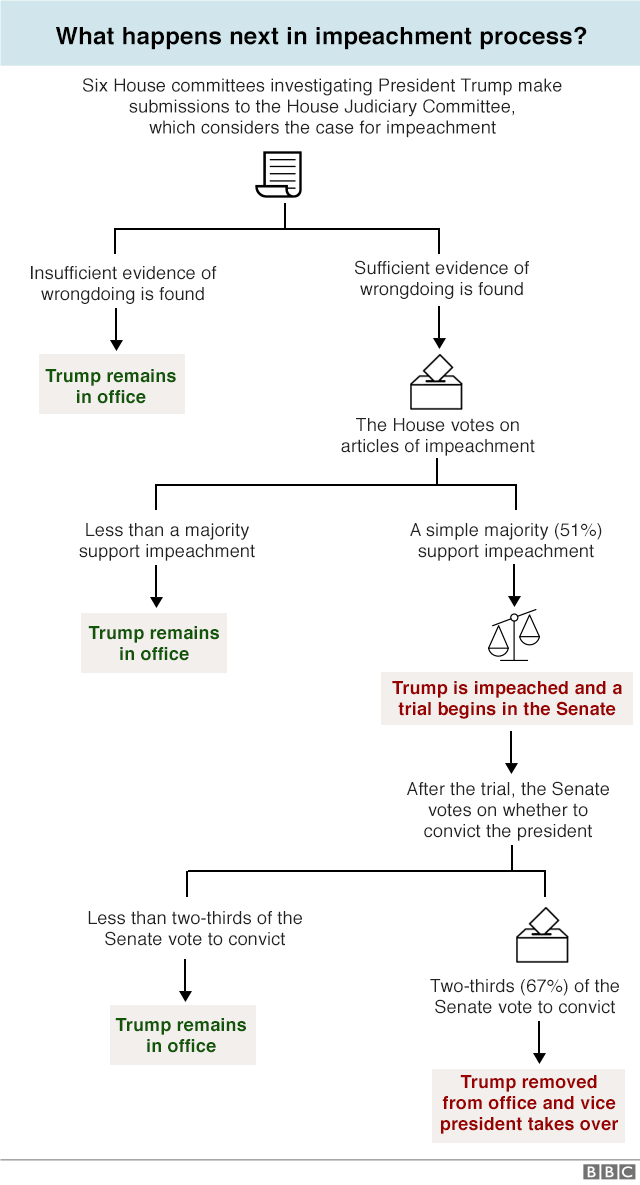


Learn more about the impeachment inquiry
- Published19 December 2019

- Published4 December 2019
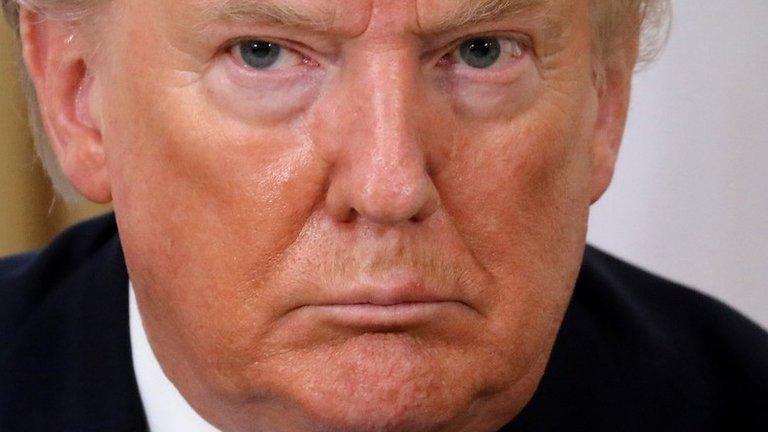
- Published26 November 2019
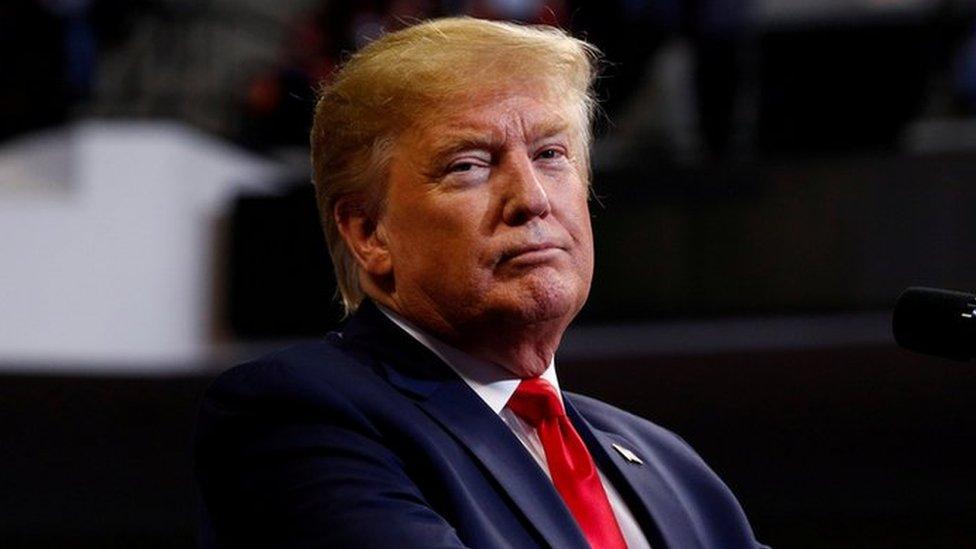
- Published26 November 2019
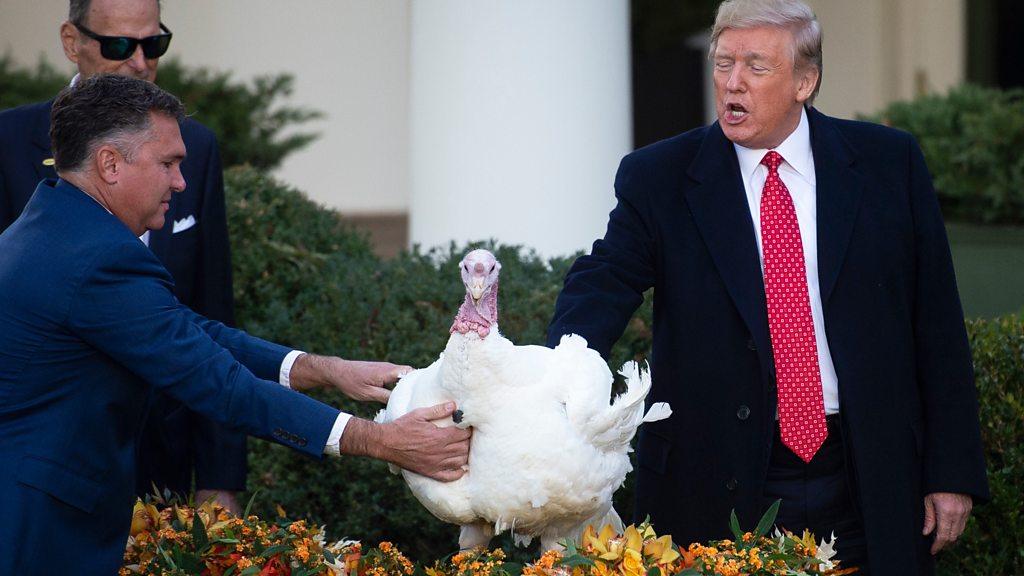
- Published19 December 2019
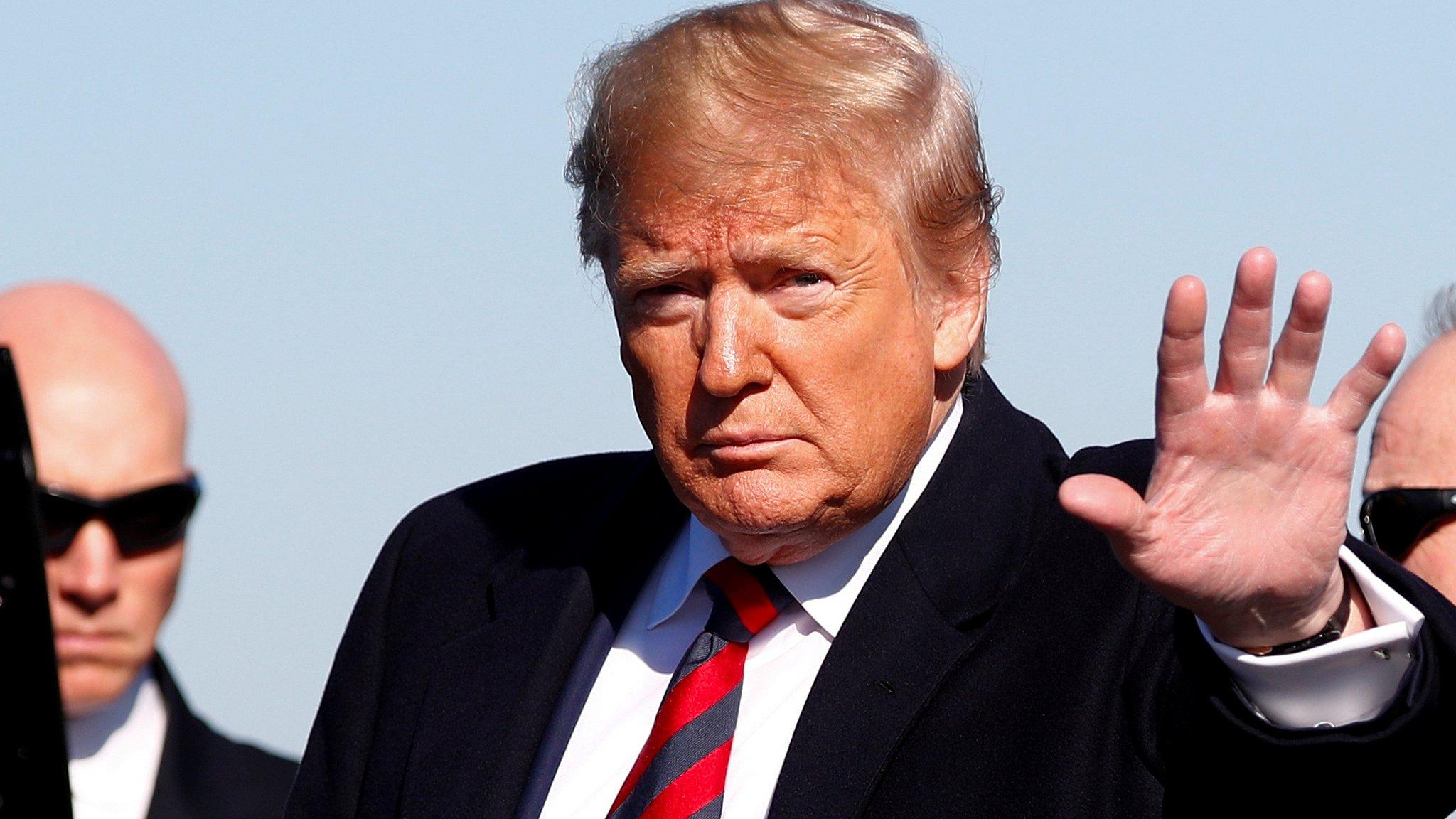
- Published27 November 2019
